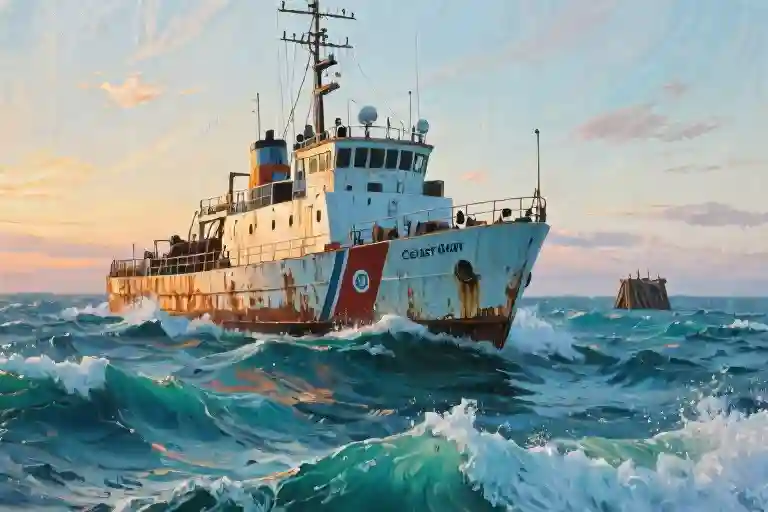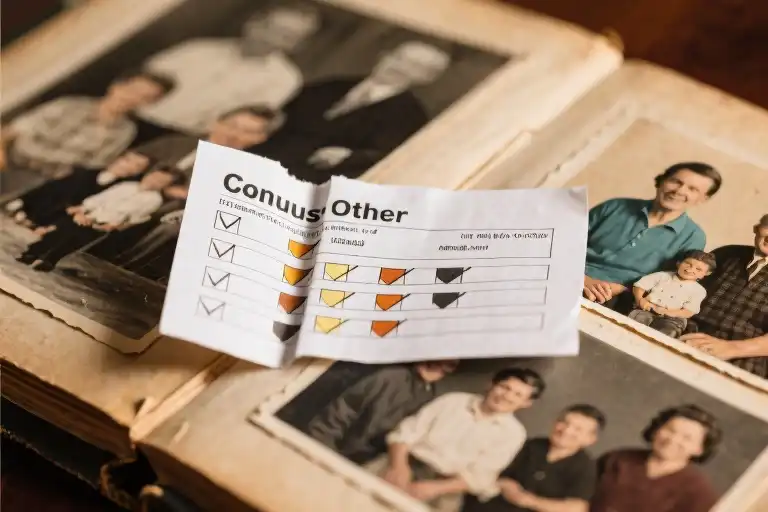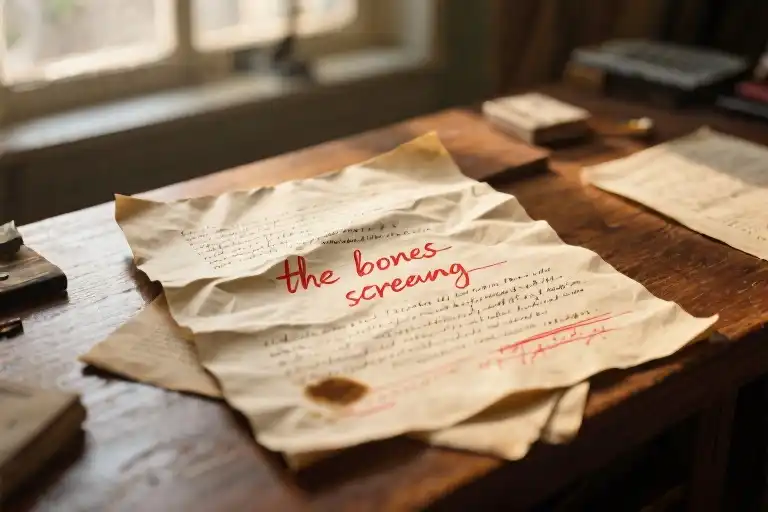The first light of dawn bleeds into the horizon, a slow seep of gold staining the sapphire expanse. Humidity clings to my skin as I grip the ship’s rail, the warm plastic of my coffee mug pressing into my palm. Below us, the ocean doesn’t wave—it breathes. Deep, measured swells rise and fall like the chest of some sleeping giant. Flying fish scatter from our wake, their translucent wings catching the new sun as they skim the water’s surface. The salt air sticks to my lips, tasting of memory.
This white ship moves with the stubborn determination of a workhorse, her engines growling beneath my feet. At nineteen, I thought the uniform would make me invisible in a different way—not like the kind that comes with being poor in California’s Central Valley, but the proud anonymity of service. The coffee in my mug has gone lukewarm, bitter at the edges like the Camel cigarette smoke curling around my face. Routine settles over the deck as crewmates discuss engine repairs and overdue car payments, their voices blending with the constant thrum of machinery.
We’ve been patrolling this stretch of ocean for fourteen days straight. My shift today is migrant watch, a task that’s grown heavier with each interception. The radar screens below deck will soon start pinging with blips—makeshift rafts cobbled together from pallet wood and desperation. Last patrol, we processed enough Cuban and Haitian migrants to fill a small town. A thousand sent back on this ship alone. The metal ladder rungs warm beneath my hands as I climb to the observation post, each step measured like the countdown to something inevitable.
Somewhere beyond the horizon, past where the ocean meets the sky in a blur of blue, there are people bailing water from failing rafts tonight. Children who’ve never seen snow clinging to parents who whisper about Miami like it’s the promised land. I know this because I’ve pulled them from the water, their clothes soaked through with salt and hope. Because sometimes when they speak, their words curl around my ears like my abuelita’s lullabies, a language I thought I’d forgotten but that still lives in the marrow of my bones.
The ship rolls gently beneath me. She’s alive in her own way—this floating piece of America with her roaring engines and strict protocols. We’ll spot the first raft by midday if patterns hold. There will be procedures to follow, forms to complete, orders to execute. And later, when the work is done, I’ll stand at this same rail watching the stars appear one by one, wondering which of those pinpricks of light might be shining down on the people we turned away.
Morning Briefing
The radar screen pulsed with a steady green glow, casting sharp shadows across the dimly lit bridge. I rubbed my eyes, the afterimage of the scanner’s sweep lingering like a fading dream. The night shift had left that particular kind of exhaustion that settles deep in the bones – not the sharp fatigue of physical labor, but the dull, persistent drain of constant vigilance. My plastic coffee mug left a faint ring on the console as I set it down, the last dregs gone cold hours ago.
‘Contact bearing two-seven-zero, range twelve nautical miles.’ The operations specialist’s voice cut through the hum of electronics. ‘Multiple small returns clustered tight. Could be a raft.’ His finger tapped the glass, circling the blips that looked no different from the usual sea clutter to my untrained eye.
I lifted the heavy binoculars, their weight familiar against my collarbone. The morning haze made the horizon swim, the line between sea and sky dissolving into a shimmering mirage. Then I saw them – not through the lenses at first, but as a darker smudge against the glittering water. As the ship closed distance, the shapes resolved into what we’d been hunting for weeks: a makeshift raft, barely larger than a pickup truck bed, riding low in the swell.
The details came into focus one by one. Faded blue tarps stretched over what might have been pallet wood. A cluster of people huddled together, their clothes clinging with salt spray. Someone had rigged a mast from what looked like a broken broom handle, a scrap of fabric limp in the still air. Then movement – a small hand waving, maybe a child’s. The binoculars trembled slightly before I realized my own hands were shaking.
‘Jesus,’ muttered the helmsman beside me. ‘They’re sitting in their own piss and puke out there.’ He wasn’t wrong – the stench reached us even before we’d closed to hailing distance, that particular cocktail of human waste, gasoline, and fear that clung to every migrant vessel we’d intercepted.
I adjusted the focus ring, watching a man in a stained yellow shirt try to shield a woman’s face from the sun with his bare hand. Their lips moved in silent conversation, words lost to the wind and engine noise. Behind them, a teenage boy worked a crude paddle fashioned from what might have been a cabinet door, his strokes sluggish with exhaustion. The raft listed dangerously with each movement, water sloshing around their ankles.
‘Standard intercept protocol,’ the lieutenant announced, his voice all business. ‘Prepare the RHIB for launch, medical kit standing by. Remember people – humanitarian mission, but maintain defensive posture.’ The unspoken words hung heavier than his orders: They might rush us. They might have weapons. They might do anything when desperate.
As I lowered the binoculars, the afterimage of that waving child’s hand burned against my eyelids. Somewhere beneath my uniform, beneath the training and procedures and chain of command, something primal stirred – the same instinct that makes you reach for a falling baby even if it’s not yours. I swallowed hard, the taste of salt and coffee gone sour on my tongue.
The engines changed pitch as we came about, the great white ship turning like some implacable force of nature. The raft grew larger in my lenses, close enough now to see the chicken wire reinforcing its sides, the mismatched plastic bottles lashed beneath as flotation. Someone had painted letters on a scrap of plywood – maybe a name, maybe a prayer – but the sea had washed most of it away.
‘All stations report ready,’ came the call over the ship’s intercom. The machinery of protocol engaged with smooth efficiency around me, but my fingers kept finding their way back to the focus ring, zooming in on faces that could have been cousins, neighbors, versions of myself from some other life. The ocean breathed between us, heavy with all the things we wouldn’t say aloud.
Central Valley Ghosts
The air in the recruiting office smelled like lemon disinfectant and stale dreams. I sat there at nineteen, fingers tracing the edge of a pamphlet showing sailors standing tall against a sunset—the kind of golden-hour shot that makes even steel ships look warm. The recruiter’s voice blended with the hum of the AC unit: ‘Stable paycheck. College money. See the world.’ His khaki collar had a coffee stain shaped like California, right where the Central Valley would be.
Back home, the orchards were dying. Not the poetic kind of death with dramatic withering, just a slow suffocation as bank notices piled up on kitchen tables. My tío’s tractor sat rusting in the front yard like a metal carcass, its tires flat from three seasons of disuse. The newspapers called it a recession, but when your entire town loses its agricultural contracts in six months, it feels more like someone pulled the earth out from under your feet.
I remember the exact moment the last packing plant closed. The sound of padlocks clicking shut carried farther than you’d think in dry air. Mom started keeping a ledger of what we owed—the numbers kept growing even when we stopped buying anything but beans and tortillas. At night I’d hear her crying through the wall, this quiet, ashamed sound like a mouse caught in a trap. That’s when I started walking to the strip mall where the recruiters set up their folding tables between the payday loan place and the 99-cent store.
What they don’t tell you about poverty is how loud silence becomes. The absence of machinery at dawn, the empty chairs at dinner when relatives left to chase work elsewhere, the way our old dog stopped barking at the mailman because no one sent letters anymore. The Coast Guard brochure showed blue water so vivid it hurt to look at—I thought maybe the ocean would drown out all that quiet.
Boot camp felt like a fever dream those first weeks. They shaved our heads and gave us identical blue uniforms, and suddenly I wasn’t the kid from the dying orchard town anymore. Just a body that could march and lift and follow orders. Strange how easy it was to disappear into that structure, like pouring water into a glass and taking its shape. At night in the barracks, I’d press my hands against the mattress to feel the ship’s vibration even when we were docked—this constant mechanical pulse that never let you forget you were part of something bigger.
Sometimes during night watch, when the ocean stretched black in every direction, I’d catch myself whispering the names of places we’d lost: Del Rey. Caruthers. Orange Cove. As if saying them could keep those towns from fading completely. The salt air made my skin raw, but I preferred it to the dust. At least salt meant you were near moving water, near life.
They never taught us how to reconcile the oath we took with the faces we’d see clinging to those makeshift rafts. How to square ‘protecting borders’ with the knowledge that every person we pulled from the water had someone back home keeping a ledger of debts too. The manual covered maritime law, knot-tying, radio protocols—nothing about the way a Cuban abuela’s hands would shake exactly like my bisabuela’s when we handed her a blanket.
Now when I drive through the Valley, the new almond orchards rise in perfect rows where our old citrus trees used to grow. The water trucks kick up dust that settles on my windshield like brown snow. I roll down the window just to smell the earth, this dirt that holds both my ancestors’ bones and the seeds of whatever comes next. The recruiter was half-right—I did see the world. Just didn’t realize it would show me my own reflection in every wave.
The Approach
The rubber boat hit the water with a slap that echoed across the stillness. We moved in practiced formation, three crew members per vessel, our gloved hands gripping the ropes along the sides. The outboard motor’s whine cut through the humid air as we closed the distance. Standard procedure: approach at 30 degrees off their starboard bow, maintain 50-yard separation until threat assessment complete. My fingers tapped the checklist laminated to my thigh—fuel level, first aid kit, signal flares—but my eyes stayed locked on the raft ahead.
It listed slightly to one side, riding low in the water. From this angle I could count the layers: plywood sheets lashed to empty oil drums with what looked like clothesline rope. A blue tarp sagged between two upright poles, makeshift shelter for the dozen figures huddled beneath. The Coast Guard training manuals called them ‘maritime migration vessels.’ Out here, they were just rafts, fragile things that shouldn’t have survived the crossing.
‘¡Por favor, ayudennos!’ A woman’s voice carried across the water, the Cuban accent curling around vowels in a way that made my stomach tighten. She stood near the front, one arm cradling a child against her hip, the other waving a faded red shirt. The motion made the whole structure sway. Behind her, a man knelt beside what appeared to be a bucket, bailing water with frantic scoops of his hands.
My grip on the boat’s rope changed. The texture of the fibers, the salt crusted into the twists—suddenly I was eight years old again, holding the clothesline in my abuela’s backyard while she pinned up my school uniform. That same sun beating down, that same smell of salt and sweat. The woman kept calling, her voice layering over memories of market days in Hialeah, of old men playing dominos and shouting over each other in rapid-fire Spanish I’d pretended not to understand when recruiters came to town.
‘Status check, Alvarez.’ The radio crackled at my shoulder. I blinked, the present snapping back into focus. The raft was closer now, close enough to see the blisters on the man’s palms as he bailed, the way the woman’s collarbones jutted against her damp shirt.
‘No visible weapons,’ I reported. ‘Twelve souls onboard, at least two minors. Vessel integrity compromised—starboard drum looks partially deflated.’ The words came out flat, the way we’d been trained. Professional. Detached. But beneath my vest, sweat trickled down my spine in a slow line, tracing the same path as the ice cream that used to drip down my wrist during those long-ago summers.
We cut the engines at 20 yards. The sudden quiet amplified every sound—the lap of waves against fiberglass, the creak of straining wood, a child coughing wetly. One of the migrants began weeping, great heaving sobs that shook his shoulders. The noise seemed to vibrate in my teeth. I reached for the water bottles we kept stacked in the boat’s center console, the plastic cool against my palms. Standard humanitarian provisions. Standard procedure.
Then the wind shifted, carrying their voices clear across the water. Not just Spanish now, but the particular cadence of my abuela’s hometown—the dropped syllables, the way ‘usted’ became ‘uté.’ A man near the back was praying, the words tumbling out in the same rhythm my tío used when his factory laid him off in ’09. These weren’t just migrants. They were abuelos and primos and kids who probably played the same street games I had. They were me, if my parents hadn’t gotten their papers in ’92.
My fingers found the edge of the laminated checklist again, rubbing across its smooth surface like a talisman. The rules were clear: locate, intercept, transfer. No exceptions. No ‘welcome.’ Just black ink on waterproof paper, orders that didn’t account for the way that little girl’s hair was braided in the same pattern my sister used to wear.
‘Prepare to distribute supplies,’ the team leader called. I passed out water bottles in slow motion, each handoff a study in contrast—my crisp uniform against their salt-stained shirts, my government-issued gloves brushing their cracked fingertips. Someone murmured thanks. Someone else asked if we were taking them to Miami. The radio buzzed again with the mothership’s coordinates for transfer.
We tied the tow line to their raft with double half hitches, the knots perfect. Textbook procedure. The sun climbed higher, bleaching the scene into something harsh and bright. Behind my sunglasses, I let my eyes unfocus until the raft became just a shape, the voices just noise. It was easier that way. The ocean stretched out around us, breathing slow and deep, as we began the long tow back to the waiting cutter.
The Burning Order
The fuel drums rolled across the deck with a hollow metallic clang that vibrated through my boots. Someone had already pried off the caps, and the sharp tang of gasoline cut through the salt air. My fingers tightened around the rag bundle – standard issue cotton soaked through with the same liquid fire we’d use to erase evidence of hope.
Procedure demanded calm. We moved like surgeons preparing instruments: methodical, gloved hands passing fuel cans, voices lowered to professional murmurs beneath the Caribbean sun. The migrants watched from our steel deck, their faces slick with sweat and something worse. I focused on the physical details – the way sunlight glinted off the chain link fencing, the rhythmic squeak of my damp boot soles against non-skid surface. Anything to avoid meeting the eyes of the woman clutching a notebook to her chest, its pages fluttering like wounded birds.
When the first torch arced through the air, time fractured into frames:
- The initial whoosh of ignition, flames licking at plywood patches on the raft
- A child’s homework sheet catching an updraft, calculus equations curling into black lace
- The exact moment the woman’s shoulders collapsed as she recognized her son’s handwriting in the burning fragments
We called it ‘rendering vessels non-navigable’ in our after-action reports. The official terminology never mentioned how fire transformed personal belongings into spectral shapes – a doll’s melted face here, the skeletal remains of a family Bible there. Smoke stung my eyes as I recorded the GPS coordinates, the acrid taste settling on my tongue like a permanent stain.
Years later, I still wake certain I smell gasoline. Not the clean scent at filling stations, but that particular cocktail of saltwater, diesel, and despair that clung to our uniforms. Sometimes when I help my niece with algebra, I’ll glimpse a stray pencil mark and suddenly see those burning equations spiraling upward against an indifferent blue sky. The Coast Guard never trained us to extinguish those kinds of fires.
What nobody prepares you for is the silence afterward. No cheers, no relieved chatter – just thirty men avoiding each other’s faces as we scrubbed soot from our hands. The ocean kept breathing beneath us, steady and ancient, while the last tendrils of smoke dissolved into nothingness. That’s when I first understood: some borders aren’t marked on any map, and crossing them leaves no visible scars.
The Uniform in the Closet
The fluorescent lights of the grocery store hummed like the engines of that old cutter. I stood frozen in the cereal aisle when I heard it – the lilt of Haitian Creole from the checkout counter. My fingers tightened around the box of Frosted Flakes like it was a lifeline. The cashier, a woman with her hair wrapped in bright yellow fabric, laughed with a customer. That laugh carried the same cadence as the voices that used to rise from those makeshift rafts.
My feet carried me past her register without meeting her eyes. I left my full cart by the magazine rack. Outside, I sat in my truck with the AC blasting, watching the condensation roll down my windshield like salt spray on a porthole. The uniform might be folded away, but the reactions remain – this involuntary stiffening when I hear certain accents, when I smell diesel mixed with seawater on the docks.
At home, the storage box in my closet exhales a sigh of mothballs when I lift the lid. The dress blues lie pressed beneath a stack of photographs: me at nineteen, squinting in Caribbean sunlight; the ship’s bow cutting through turquoise water; a group of us leaning against the helicopter pad, faces young enough to be my sons now. The gold buttons still shine if I polish them, but the fabric holds onto smells no dry cleaner can remove – sweat, salt, and that particular tang of guilt that seeps into wool.
Sometimes I take the coat out just to feel its weight. The epaulettes leave dents in my palms where the braid digs in. I wonder if the Haitian woman at the store has relatives who remember our ship’s hull number, if they curse it the way I sometimes bless it for getting me out of that dying town. The irony doesn’t escape me – wearing the same uniform that once made my abuelita proud while turning away people who remind me of her.
Most days I can ignore the box’s presence. But when the Santa Ana winds blow inland from the coast, bringing that briny edge to the air, I catch myself standing at the closet door like it’s the ship’s rail again. The ocean has a long memory, and so do I. The photographs have started to yellow at the edges, but the faces in them – mine and theirs – only grow sharper with time.
The coffee stain at the bottom of my mug has dried into the shape of a coastline—jagged like the edges of memory. Fourteen years haven’t smoothed it out. I press my thumb against the ceramic curve where Florida should be, feeling the ghost heat of that last patrol morning when the ocean tasted different. Not like salt. Like metal.
Midnight waves fold over themselves in the dark, whispering in the same rhythm as the ship’s engines used to. The sound pulls at something behind my ribs. Out here on this California beach, the Pacific pretends not to know me, but my body remembers. The way my knees still lock at sharp angles when I sit, trained by years of bracing against swells. How my hands automatically cup around imaginary binoculars when I scan the horizon.
A lighter flares in the distance—some night fisherman maybe—and for half a breath I’m nineteen again, watching gasoline-soaked rags catch fire on the water. The black smoke rises behind my eyelids just as clearly now as it did then. We called it ‘rendering vessels inoperable’ in the manuals. The migrants had other words for it. Words that curled like the burning edges of their children’s notebooks floating in our wake.
The thermos lid won’t screw on right. Threads worn down from too many dawns like this one, where I come to listen to waves instead of sleeping. The ocean doesn’t care about borders or oaths or pensions. She breathes the same whether she’s lifting a raft made of pallets or a cutter full of armed men. That’s why I keep coming back, I think. Not for absolution. Just to stand where something bigger than nations can say, without judgment, that it remembers what we did.
My phone buzzes with a Veterans Day discount email from some outdoor gear company. The screen’s glow catches on my dog tags left deliberately in the cup holder—a test I keep failing. You’re supposed to move on. Get the lawn chair version of closure. But the truth is, I don’t want to forget their faces. Not the woman who clutched her baby like human flotation device, not the old man whose hands looked like my abuelo’s when we pulled him aboard. Especially not the boy who asked, in perfect English, if we were the good guys.
The last sip of coffee has gone cold and gritty with sand. I pour it out onto the beach, watching the liquid disappear between grains. Some rituals don’t need meaning to be necessary. Tomorrow I’ll probably come back. The waves will still know all the words to that old lullaby, even when I pretend not to remember.




